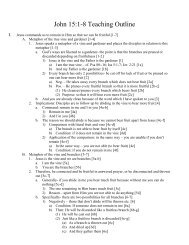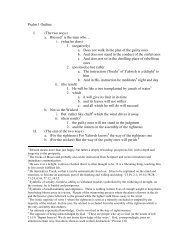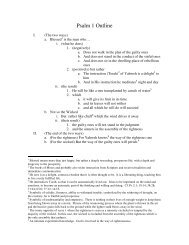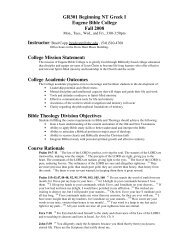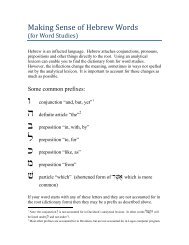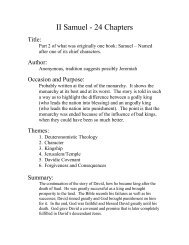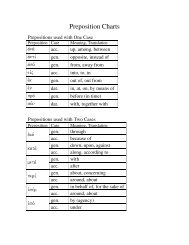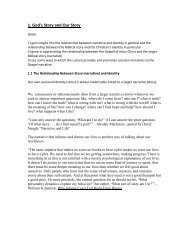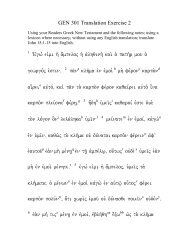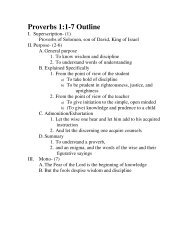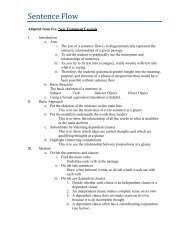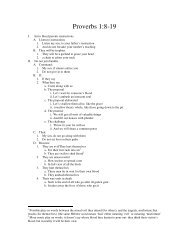Flow of thought- How Clauses and Sentences Relate - Bradcopp.com
Flow of thought- How Clauses and Sentences Relate - Bradcopp.com
Flow of thought- How Clauses and Sentences Relate - Bradcopp.com
You also want an ePaper? Increase the reach of your titles
YUMPU automatically turns print PDFs into web optimized ePapers that Google loves.
<strong>Flow</strong> <strong>of</strong> <strong>thought</strong>- <strong>How</strong> <strong>Clauses</strong> <strong>and</strong> <strong>Sentences</strong> <strong>Relate</strong><br />
I. Coordinate statements- Independent statements<br />
A. Series<br />
John 1:1 VEn avrch/|<br />
Def: Two statements that follow one after another, without much specific<br />
connection- “<strong>and</strong>”<br />
Eng: I listened to music. And I went to the store.<br />
h=n o` lo,goj( kai. o` lo,goj h=n pro.j to.n qeo,n( kai. qeo.j h=n o` lo,gojÅ<br />
In beginning was the word <strong>and</strong> the word was with (the) God <strong>and</strong> God was the word.<br />
Greek construction: kai “<strong>and</strong>” de “<strong>and</strong>, but” te “<strong>and</strong>” no marker<br />
B. Progression<br />
Def: Two statements that follow one another, similar to series, but suggest<br />
movement, growth <strong>and</strong> flow toward a climax- “<strong>and</strong>”<br />
Eng: I got on my bike <strong>and</strong> I went to the store.<br />
Rom 8:30 ou]j de. prow,risen( tou,touj kai. evka,lesen\ kai. ou]j evka,lesen( tou,touj kai.<br />
who <strong>and</strong> He predestined these also He called <strong>and</strong> who He called these also<br />
evdikai,wsen\ ou]j de. evdikai,wsen( tou,touj kai. evdo,xasenÅ<br />
He justified who <strong>and</strong> He justified these also He glorified<br />
Greek construction: kai “<strong>and</strong>” de “<strong>and</strong>, but” men …de… “not only… but<br />
also…”<br />
C. Alternative<br />
Def: Two statements that say the opposite, contrasting statements- “but”<br />
Eng: I went to the store. But I didn’t go to the park.<br />
Acts 28:24 kai. oi` me.n evpei,qonto toi/j legome,noij(<br />
And they on the one h<strong>and</strong> were convinced by the words spoken<br />
oi` de. hvpi,stoun\<br />
(different) they on the other h<strong>and</strong> refused to believe<br />
Greek construction: alla “but” de “<strong>and</strong>, but” men…de… “on the one<br />
h<strong>and</strong>…on the other h<strong>and</strong>…”
II.<br />
Subordinate statements- dependent statements- (larger independent<br />
sentences <strong>and</strong> paragraphs can also be related in these ways)<br />
A. Restatement<br />
1. means, manner<br />
Def: The subordinate clause tells the means or manner by which the main<br />
action is ac<strong>com</strong>plished, answers the question “how” - “by…”<br />
Eng: I went to the store by riding my bike.<br />
Matt. 6:27 ti,j de. evx u`mw/n merimnw/n du,natai prosqei/nai<br />
who but from you by worrying is able to add<br />
evpi. th.n h`liki,an auvtou/ ph/cun e[naÈ<br />
upon the lifespan <strong>of</strong> him cubit one <br />
Greek Construction: Usually participle<br />
2. <strong>com</strong>parative<br />
Def: A statement is clarified by saying it is “like” another statement- “as,<br />
like”<br />
Eng: Just like a daredevil rides, I rode to the store.<br />
John 20:21 kaqw.j avpe,stalke,n me o` path,r( kavgw. pe,mpw<br />
u`ma/jÅ<br />
Just as He sent me the Father I also I am sending you<br />
Greek Construction: w`j “as, like” kaqwj “just like”<br />
3. negative-positive<br />
Def. Two alternative statements are contrasted, one is explicitly affirmed<br />
<strong>and</strong> one explicitly denied. - “Not…., but…”<br />
Eng: I did not go to the Arcade, but I went to the store.<br />
Eph 5:17 mh. gi,nesqe a;fronej( avlla. suni,ete<br />
ti, to. qe,lhma tou/ kuri,ouÅ<br />
not be foolish but underst<strong>and</strong> what the will <strong>of</strong> the Lord (is)<br />
Greek Construction: ou/mh…alla… “not….but…”
4. general-specific<br />
Def. A statement is elaborated by giving a specific example. -“for<br />
example…”<br />
Eng: I bought some food. I bought bread. I bought soup.<br />
Eph. 5:21-22 ~Upotasso,menoi avllh,loij<br />
evn fo,bw| Cristou/(<br />
Submit to one another in fear <strong>of</strong> Christ<br />
ai` gunai/kej toi/j ivdi,oij<br />
avndra,sin<br />
the wives to the their own husb<strong>and</strong>s<br />
Greek Construction – no markers (logical connection, not grammatical)<br />
5. fact-interpretation<br />
I Cor. 10:4 e;pinon<br />
Def. A statement is explained by elaborating on some facet. -“that is…”<br />
Eng: I wrecked my bike. I fell over the h<strong>and</strong>lebars <strong>and</strong> rolled down the<br />
hill.<br />
ga.r evk pneumatikh/j avkolouqou,shj pe,traj(<br />
they drank for from spiritual following rock<br />
h` pe,tra de. h=n<br />
the<br />
o` Cristo,jÅ<br />
rock <strong>and</strong> was (the) Christ<br />
Greek Construction- no markers (logical connection, not grammatical)<br />
6. question-answer<br />
Def: A question (rhetorical or direct) is followed by the answer.<br />
Eng: Where is my bike It is at the store.<br />
Romans 6:1-2 …evpime,nwmen<br />
th/| a`marti,a| …È mh. ge,noitoÅ<br />
shall we remain in the sin …. not may it be!<br />
Greek Construction ; (question mark)
7. disclosure-content<br />
Def: The first statement is a formula stating that a source is about to be<br />
quoted. The second statement is the content <strong>of</strong> the quote.<br />
Eng: I said to my brother, “Let’s go ride bikes.”<br />
Ephesians 5:14 dio. le,gei( :Egeire( o` kaqeu,dwn<br />
Therefore it says “wake up” the one sleeping<br />
Greek Construction ge,graptai le,gei<br />
B. Distinct statement<br />
1. causal- ground<br />
Def. The reason or cause <strong>of</strong> a statement is given after the statement- “because”<br />
Eng: I went to the store because I was hungry.<br />
Matt. 5:5 maka,rioi oi` praei/j( o[ti auvtoi. klhronomh,sousin th.n gh/nÅ<br />
Blessed the meek because they will inherit the l<strong>and</strong>, earth<br />
Greek Construction: gar “for, because” o`ti “because<br />
2. causal- inference<br />
Def: The same relationship as ground, but in reverse order, the reason or cause<br />
is given first, then the action or fact that naturally follows as a consequence-<br />
“therefore”<br />
Eng: I have no food. Therefore, I am going to the store.<br />
Matt. 23:3 pa,nta ou=n o[sa eva.n ei;pwsin u`mi/n poih,sate kai. threi/te(<br />
…they sit in Moses’ seat, all things therefore which if they say to you, do <strong>and</strong> keep<br />
Greek Construction: ara “therefore” oun “therefore” ara oun
3. result- cause/effect<br />
Def: relationship between one statement <strong>and</strong> automatic result- “so that”<br />
Eng: I ate all the c<strong>and</strong>y so that I felt sick.<br />
Acts 16:26 a;fnw de. seismo.j evge,neto me,gaj w[ste saleuqh/nai ta. qeme,lia<br />
suddenly <strong>and</strong> earthquake there was great so that to shake the foundations<br />
Greek Construction: w`ste “so that” w`ste + infinitive eij “into”<br />
4. conditional/effect<br />
Def: Same as causal except one statement may or may not be true <strong>and</strong> the<br />
other depends on the first statement- “if…then..”<br />
Eng: If the store has donuts, then I’ll be happy.<br />
John 14:15 VEa.n avgapa/te, me( ta.j evntola.j ta.j evma.j thrh,sete\<br />
If you love me the <strong>com</strong>m<strong>and</strong>s the mine keep<br />
Greek Construction: ei “if” ean “if”<br />
5. purpose- means to an end<br />
Def: gives the intent/perceived reason for an action with focus on the intended<br />
out<strong>com</strong>e whether that out<strong>com</strong>e takes place or not.- “in order that”<br />
Eng: I went to the store in order to buy food.<br />
I Cor. 9:12 avlla. pa,nta ste,gomen( i[na mh, tina evgkoph.n dw/men<br />
…but all things we bear in order that not some hindrance we may give<br />
Greek Construction: eij “into” iǹa + subjunctive “in order that”<br />
Infinitive “to” eij + infinitive
6. temporal- time relationships<br />
a. preceding<br />
Def: dependent clause takes place before the main clause.- “after”<br />
Eng: I went home after I went to the store.<br />
John 4:43 Meta. de. ta.j du,o h`me,raj<br />
after but the two days<br />
evxh/lqen<br />
he went out…<br />
Greek Construction: meta “after” meta to + infinitive aorist<br />
participle<br />
b. contemporary<br />
Def: dependent clause takes place at the same time as main- “when”<br />
Eng: I had fun when I rode my bike.<br />
Luke 24:51 evn tw/| euvlogei/n auvto.n auvtou.j die,sth avpV auvtw/n<br />
while blessing He them he departed from them<br />
Greek Construction: en “in, when” en tw + infinitive present<br />
participle<br />
c. following<br />
Def: dependent clause takes place after the main clause- “before”<br />
Eng: I tied my shoes before I rode my bike.<br />
John 4:49 kata,bhqi pri.n avpoqanei/n to. paidi,on mouÅ<br />
<strong>com</strong>e down before dies the child <strong>of</strong> mine<br />
Greek Construction: eẁj “until” pro “before” acri “until” prin<br />
“before” prin + infinitive pro + infinitive future participle
7. Location<br />
Def: The relationship between an action <strong>and</strong> the place where this action<br />
happened or will happen.<br />
Eng: Wherever there is a steep hill, I will ride my bike.<br />
Matthew 24:28 o[pou eva.n h=| to. ptw/ma( evkei/ sunacqh,sontai oi` avetoi,Å<br />
Where if it may be the corpse there gather together the vultures<br />
Greek Construction: o`pou “where” o[qen “from where”<br />
8. Situation- Response<br />
Def: The relationship between a circumstance <strong>and</strong> a person’s reaction to it.<br />
The reaction is not a necessary result.<br />
Eng: My bike got a flat. I screamed at my bike.<br />
John 7:21 }En e;rgon evpoi,hsa kai. pa,ntej qauma,zeteÅ<br />
One work I did <strong>and</strong> everything you marvel at<br />
Greek Construction: No specific marker<br />
C. Support by contrary statement<br />
Eph 2:5 kai.<br />
1. concessive, adversative<br />
Def: the statement is affirmed in spite <strong>of</strong> apparently contrary information-<br />
“even though”<br />
Eng: I went to the store even though I had no money.<br />
o;ntaj h`ma/j nekrou.j sunezwopoi,hsen tw/| Cristw/<br />
And (even though) being us dead he made alive with the Christ<br />
Greek Constructions: participle alla “but” mallon “rather”
2. Situation- (-)Response<br />
Def: The relationship between a circumstance <strong>and</strong> a person’s reaction to it.<br />
The reaction is not a necessary result. In this case, the reaction goes against<br />
the reasonably expected result<br />
Eng: I <strong>of</strong>fered Joey a ride on my bike, but he hit me!<br />
John 7:21 }En e;rgon evpoi,hsa kai. pa,ntej qauma,zeteÅ<br />
One work I did <strong>and</strong> everything you marvel at<br />
Greek Construction: No specific marker<br />
D. Relative statement<br />
1. simple relative<br />
Def: A <strong>com</strong>plete sentence functions as an adjective by using the relative<br />
pronoun- there is really only one statement being made- “who”, “which”<br />
Eng: I went to the store which is at the end <strong>of</strong> the street.<br />
Gal 3:10 VEpikata,ratoj pa/j o]j ouvk evmme,nei pa/sin toi/j gegramme,noij<br />
Cursed all who not remain in all the things written<br />
Greek Construction: o`j relative pronoun “who, which”<br />
2. progressive relative<br />
Def: A <strong>com</strong>plete sentence functions as an adjective by using the relative<br />
pronoun- In this case, it has the form <strong>of</strong> a simple adjectival idea, but it really<br />
functions to move the argument forward “who”, “which”<br />
Eng: I saw my friend, who ran after me.<br />
Colossians 1:13-15 tou/ uiòu / … o[j evstin eivkw.n tou/ qeou<br />
the Son who is image <strong>of</strong> the God<br />
Greek Construction: o`j relative pronoun “who, which”
Function <strong>of</strong> infinitives<br />
I. Infinitive without article (“the”)<br />
A. Simple Infinitive<br />
1. Purpose<br />
2. Result (cause-effect)<br />
3. Means to end (rare)<br />
4. Subject<br />
5. Direct object<br />
B. prin + Infinitive- following time<br />
C. w`j + Infinitive<br />
1. Purpose<br />
2. Result (cause-effect)<br />
D. w`ste + Infinitive<br />
1. Purpose (rare)<br />
2. Result (cause-effect)<br />
II. Infinitive with article<br />
A. Without preposition<br />
1. Article in nominative case- Subject<br />
2. Article in accusative case- Direct object<br />
3. Article in genitive case<br />
a. Purpose<br />
b. Result (cause-effect)<br />
c. Contemporary time<br />
4. Very rare with dative case<br />
B. With preposition<br />
1. dia to + infinitive<br />
a. causal- ground<br />
b. contemporary time (rare)<br />
2. eij to + infinitive<br />
a. Purpose<br />
b. Result (cause-effect)<br />
3. en tw + infinitive<br />
a. Result (rare)<br />
b. Contemporary time<br />
c. Means to end<br />
4. meta to + infinitive- preceding time<br />
5. proj to + infinitive<br />
a. Purpose<br />
b. Result (cause-effect)
Function <strong>of</strong> Participles<br />
I. With article- adjectival<br />
A. modifying noun- adjective “the running dog”<br />
II.<br />
B. with no noun- substantival “the one running”<br />
Without article- adverbial- exact function from helping words <strong>and</strong> logical<br />
context<br />
A. Temporal- time<br />
B. Means to end<br />
C. Cause<br />
D. Condition<br />
E. Concessive<br />
F. Purpose<br />
G. Result (cause-effect)<br />
H. Periphrastic- “to be” verb + participle function as one verb



